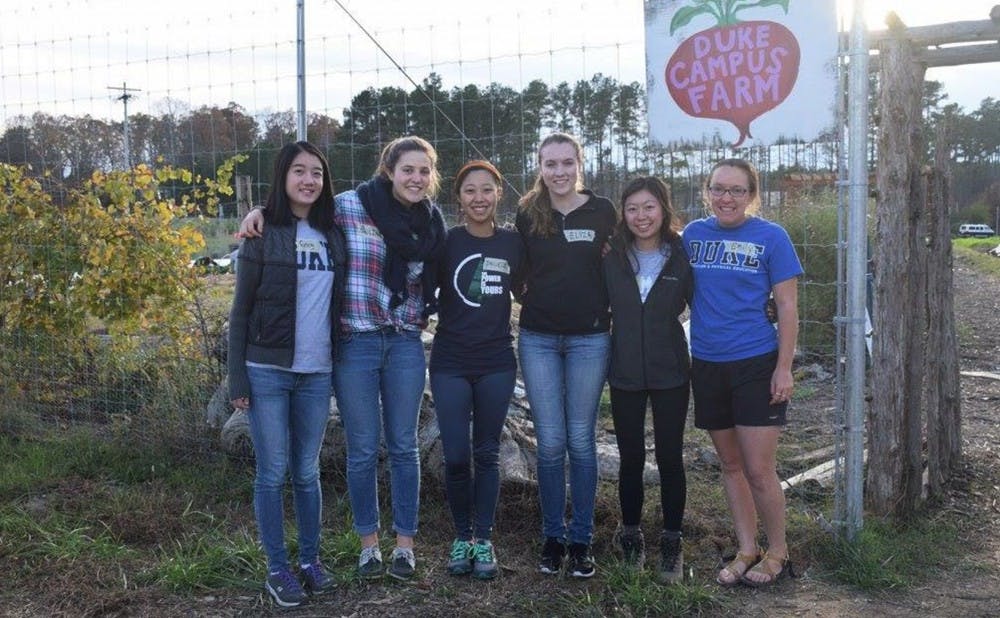Blackwell residence hall has won East Campus' annual Eco-Olympics, beating the other first-year dorms with 1,569 points.
Eco-Olympics—held every fall for first-year dorms—encourages students to attend environmental-related events and participate in eco-friendly activities, from getting a Green Dorm Room Certification to working at the Duke Campus Farm for a day. Students competed to earn points for their dorm from Nov. 1 to 22. As the winner of the Eco-Olympics, Blackwell will receive a free dorm meal cooked by Chef Njathi Kabui from Organics and Sound, an organization that promotes sustainable cooking.
“I thought it was a very interesting experience,” said freshman Pauline Grieb, a member of the Duke Environmental Alliance, which sponsored the Eco-Olympics. “For the events, even if the attendance was limited, people were very interested in the topics. You had people who were environmental science majors and people who had no idea about the environment.”
The poor weather early in the competition limited the exposure that the Eco-Olympics could have had, Grieb said. She noted that even during the third week of Eco-Olympics, some students were still unaware of the event.
This year’s Eco-Olympics was better organized and more well-prepared than past years, said DEA co-president Kelly Shen, a senior. She also explained that the event represented a significant effort to engage other student groups.
“We worked with other groups a lot more this year, which really helped Eco-Olympics to gain momentum,” Shen said. “For example, we partnered with Duke Students for Humane Borders and Mi Gente for a speaker event, and drew in various campus groups such as Food for Thought, Roots and Shoots, Duke Campus Keepers and the Duke Campus Farm at our opening ceremony.”
Shen also said that the event gained more traction and engaged more people compared to previous years. She added, however, that it still took some time for people to “catch on,” and by the time many students participated, it was already over.
Grieb said her favorite Eco-Olympics experience was the environmental justice-themed meet-and-greet with photographer and environmental activist Krista Schlyer, who captures animals and people on the border between United States and Mexico. Grieb explained that by showcasing Schlyer's work, the event shed light on environmental issues—such as a literal wall that prevents the migration of important species—that can lead to the degradation of human life.
“[Schlyer] had this interesting approach behind the lens experiencing nature,” Grieb said. “It was interesting to see. Anyone would be interested in the topic—it’s linked to public policy, finance, environment and more.”
Other notable events included a Campus Farm work day, where Kabui joined the students and brought many snacks. Students learned about the history of the Campus Farm, including its roots in a time when slavery was prominent in American agriculture.
“The farm is about so much more than just farming,” freshman Sunny Zhang wrote in an email. “[Our guide] Emily explained how the farm integrates the history and culture of Durham. There were tobacco and cotton plants, for example, as a tribute to the monoculture, slave-labor days of the land.”
The month of events also included a screening of the documentary “A Place at the Table,” co-directed by Kristi Jacobson, Trinity '93. The film discussed food insecurity and food deserts—regions where people have no access to a local supermarket or to fresh food and can only subsist on fast food. DEA advisor Danielle Su, a senior, explained that it is one of the most pressing and complex issues in the United States at the intersection of environmental, social and political elements.
During the closing ceremony, Larry Moneta, vice president for student, affairs gave a speech about eco-awareness and opened up the discussion to the audience. Moneta mentioned that he had been vegan for 9 years and explained the careful decision-making that goes into purchasing produce and poultry from safe, sustainable sources. For example, he noted that the chicken served at Duke Dining venues is free of antibiotics.
“The fact that we struck the interest of people totally unrelated to the field of environmental science and those who are avid environmentalists—I feel like everyone had some sort of part to play,” Grieb said.
Get The Chronicle straight to your inbox
Signup for our weekly newsletter. Cancel at any time.

